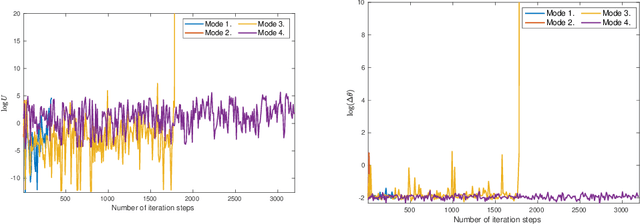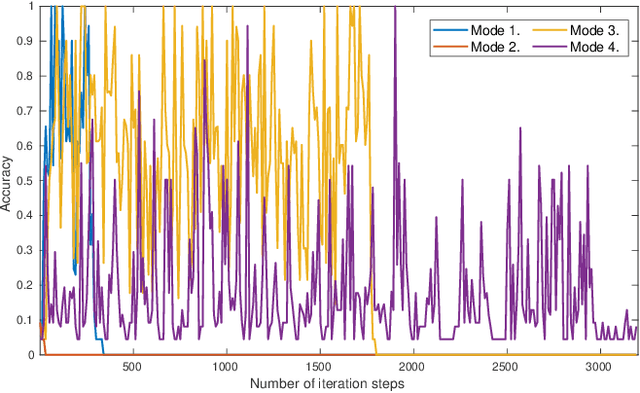Miklós Rásonyi
On the strong stability of ergodic iterations
Apr 18, 2023Abstract:We revisit processes generated by iterated random functions driven by a stationary and ergodic sequence. Such a process is called strongly stable if a random initialization exists, for which the process is stationary and ergodic, and for any other initialization, the difference of the two processes converges to zero almost surely. Under some mild conditions on the corresponding recursive map, without any condition on the driving sequence, we show the strong stability of iterations. Several applications are surveyed such as stochastic approximation and queuing. Furthermore, new results are deduced for Langevin-type iterations with dependent noise and for multitype branching processes.
Functional Central Limit Theorem and Strong Law of Large Numbers for Stochastic Gradient Langevin Dynamics
Oct 05, 2022Abstract:We study the mixing properties of an important optimization algorithm of machine learning: the stochastic gradient Langevin dynamics (SGLD) with a fixed step size. The data stream is not assumed to be independent hence the SGLD is not a Markov chain, merely a \emph{Markov chain in a random environment}, which complicates the mathematical treatment considerably. We derive a strong law of large numbers and a functional central limit theorem for SGLD.
Taming neural networks with TUSLA: Non-convex learning via adaptive stochastic gradient Langevin algorithms
Jun 25, 2020


Abstract:Artificial neural networks (ANNs) are typically highly nonlinear systems which are finely tuned via the optimization of their associated, non-convex loss functions. Typically, the gradient of any such loss function fails to be dissipative making the use of widely-accepted (stochastic) gradient descent methods problematic. We offer a new learning algorithm based on an appropriately constructed variant of the popular stochastic gradient Langevin dynamics (SGLD), which is called tamed unadjusted stochastic Langevin algorithm (TUSLA). We also provide a nonasymptotic analysis of the new algorithm's convergence properties in the context of non-convex learning problems with the use of ANNs. Thus, we provide finite-time guarantees for TUSLA to find approximate minimizers of both empirical and population risks. The roots of the TUSLA algorithm are based on the taming technology for diffusion processes with superlinear coefficients as developed in Sabanis (2013, 2016) and for MCMC algorithms in Brosse et al. (2019). Numerical experiments are presented which confirm the theoretical findings and illustrate the need for the use of the new algorithm in comparison to vanilla SGLD within the framework of ANNs.
Markov chains in random environment with applications in queueing theory and machine learning
Dec 18, 2019Abstract:We prove the existence of limiting distributions for a large class of Markov chains on a general state space in a random environment. We assume suitable versions of the standard drift and minorization conditions. In particular, the system dynamics should be contractive on the average with respect to the Lyapunov function and large enough small sets should exist with large enough minorization constants. We also establish that a law of large numbers holds for bounded functionals of the process. Applications to queuing systems and to machine learning algorithms are presented.
 Add to Chrome
Add to Chrome Add to Firefox
Add to Firefox Add to Edge
Add to Edge